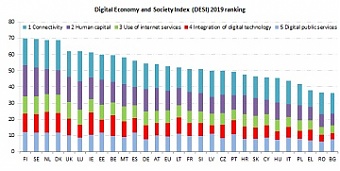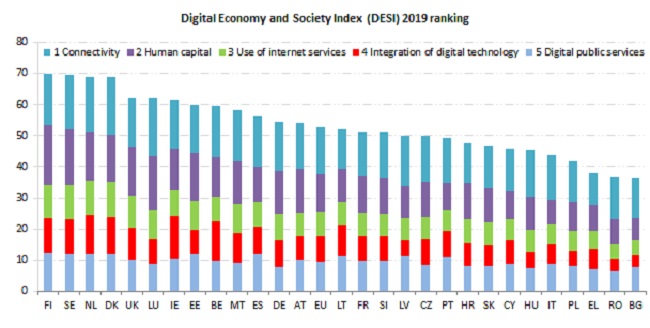Baltic, EU – Baltic States, Innovations, Internet, Latvia, Rating, Technology
International Internet Magazine. Baltic States news & analytics
Friday, 26.04.2024, 10:46
Latvia ranks 17th in EU Digital Economy and Society Index
 Print version
Print version |
|---|
In this year’s index, the top countries include Finland, Sweden, the Netherlands, Denmark and the UK. Among the Baltic states, Estonia ranked 8th, and Lithuania – 14th.

Compared to last year, Latvia has climbed one position because performance in several areas has improved.
Latvia performs well in Digital public services and Connectivity thanks to the wide availability of fast and ultrafast fixed and mobile broadband networks and the increased take-up of e-government services. However, the Latvian business sector still scores below the EU average on the Integration of digital technology and also on the Human capital dimension. Nearly half the population still lacks basic digital skills and the supply of ICT specialists has not kept pace with growing demand in the labour market. Latvia has made most progress with Digital public services. However it is a long way behind as regards the Use of digital technologies by businesses, with Latvian enterprises failing to make use of the opportunities offered by e-commerce. They are also far below the EU average in their use of social media, the report says.
Among all dimensions, Latvia scores best in e-government. Progress is driven by the growing number of Latvians who actively use e-government services and by the increased availability of pre-filled forms and open data.
Latvia performs above the EU average on the overall connectivity indicator and has maintained a comparable pace of progress in line with the EU average over the last few years. The country's main strengths are the extremely advanced coverage of ultrafast broadband (with 90 percent of households covered, against 60% in the EU as a whole), coupled with the relatively good take-up of such connections (32% of households, against 20% in the EU as a whole). 4G in Latvia covers nearly 100% of households. Mobile broadband take-up is substantially above the EU average and it further improved considerably in 2018, reaching 123 subscriptions per 100 people. In contrast, Latvia is tailing the EU in fixed broadband coverage (94% of households, against 97% at EU level) and its related take-up (60%, against 77% at EU level), owing to a persistent gap in some rural areas. Broadband prices in Latvia are in line with the EU average.
Latvia is well equipped with very high-speed fixed network infrastructure, has near-complete 4G coverage of households, and is prepared for early 5G deployment in the 3.4-3.8 GHz band. However, deploying the last mile in a number of remaining white areas remains a challenge. In the medium to long term, access to and the renting of property in order to install the many base stations required for 5G might hinder 5G deployment.








 «The Baltic Course» Is Sold and Stays in Business!
«The Baltic Course» Is Sold and Stays in Business!

